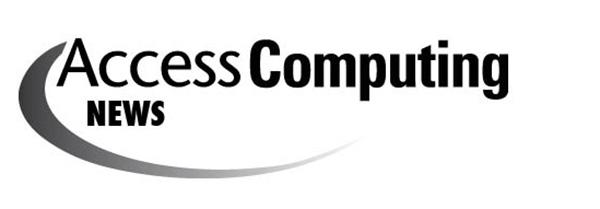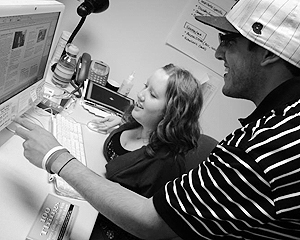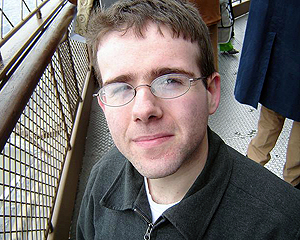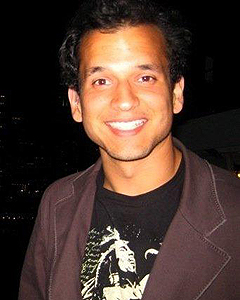AccessComputing News - November 2010

Led by the Department of Computer Science & Engineering and DO-IT (Disabilities, Opportunities, Internetworking, and Technology) at the University of Washington, AccessComputing is supported by the National Science Foundation (grant #CNS-0540615, CNS-0837508, and CNS-1042260). Any opinions, findings, and conclusions or recommendations expressed in this material are those of the authors and do not necessarily reflect the views of the National Science Foundation. For further information, to be placed on the mailing list, to request materials in an alternate format, or to donate funds to AccessComputing contact:
University of Washington
Box 354842
Seattle, WA 98195-4842
accesscomp@uw.edu
doit@uw.edu
www.uw.edu/accesscomputing
206-221-4171 (Fax)
206-685-DOIT (3648) (voice/TTY)
888-972-DOIT (3648) (toll free voice/TTY)
509-328-9331 (voice/TTY) Spokane
Dr. Richard Ladner, PI
Sheryl Burgstahler, Co-PI
Below are the articles of the AccessComputing News - November 2010 newsletter. These articles can also be seen all on one page at the Full Newsletter option.
Engage in AccessComputing (AccessComputing News - November 2010)

Students with disabilities:
- Internships
- E-mentoring
- AccessComputing Team
- Summer programs
Educators & employers:
- Host an intern
- Communities of practice
- E-mentoring
AccessComputing Minigrants Available (AccessComputing News - November 2010)
The Alliance for Access to Computing Careers (AccessComputing) has funds available to support training, experiential learning, and information technology (IT)-related activities nationwide. The goal is to increase the number of people with disabilities, including post-9/11 veterans, successfully pursuing computing careers.
Since 2006, minigrant funds have been used to expand existing computing events to involve students with disabilities, create new stand-alone events designed to attract and support students with disabilities into computing fields, and support professional development opportunities.
AccessComputing is funded by the National Science Foundation (NSF, grant #CNS-0540615, CNS-0837508, and CNS-1042260. For AccessComputing minigrant success stories, visit www.washington.edu/accesscomputing/kb.html. To submit a proposal consult www.uw.edu/accesscomputing/minigrant.html.
Youth Slam (AccessComputing News - November 2010)
Youth Slam is a popular summer event hosted by the National Federation of the Blind. At Youth Slam, high school students with visual impairments are engaged in challenging activities designed to build confidence and increase science literacy. At the 2007 and 2009 Youth Slam events, teams from the University of Washington offered instant messaging (IM) chatbots as a computer science track topic, funded by an AccessComputing minigrant. An IM chatbot is a program that can send and receive instant messages from a human. For example, a weather chatbot might answer questions like "What is the weather in Seattle today?"
The five-day chatbot workshop provided each student with a computer workstation and accessibility software. Programming activities were interspersed with other computer science activities as well as interviews with blind and low-vision role models in the computing field.
Five to seven instructors, most of whom were computer science students, facilitated the workshop. The instructors engaged the students—answering questions, teaching, and giving ideas for specific chatbots that the students might be interested in creating. Students who used screen readers employed headphones so as not to disturb the class when the computer spoke to them. On the final day, each student demonstrated their chatbot to the entire group. Students learned that programming can be hard work, but they left with a sense of accomplishment and pride in their chatbots.
Computing for Everyone (AccessComputing News - November 2010)
Recently, I presented "Computing for Everyone" at two events for high school computer science teachers: the Computer Science Teachers Association (CSTA) annual meeting and the CS4HS summer workshop.
My presentation began with photographs of successful scientists with disabilities, ending with a photo of Stephen Hawking. The message was that "people with disabilities can do almost anything in almost any scientific field." I hoped to convey that people with disabilities are often accomplished and successful when given the opportunities and access they need. Below you will find an overview of the information provided in these presentations.
There are different models of disability and they influence our perceptions of what people with disabilities can do. Reviewing the data, about 16% of the U.S. population is disabled and only 1% of PhDs in science, technology, engineering, and mathematics (STEM) fields is disabled. There is much room for growth.The University of Washington is conducting research in accessible computing, projects include VoiceDraw, WebAnywhere, Supple, ClassInFocus, and Tactile Graphics. Human-Computer Interaction research is also working to make STEM more accessible through user centered design and universal design. By designing products that empower users with disabilities, they are encouraged and enabled to solve their own accessibility dilemas. One example of this in action is a student who is blind who, while in high school, solved a problem of accessibility to mathematics by programming a translator of Nemeth code, a Braille code for math, and LaTex, a standard markup code for math. This student reached the highest level of empowerment by being able to program her own solution to an accessibility problem.
AccessComputing recruited four teachers who are deaf to attend the CS4HS workshop. One of the workshop leaders later commented, "All of the teachers were really appreciative of the presence of the teachers who were deaf as well as the sign language interpreters." He added that one of the AccessComputing-funded participants "was easily the most engaged participant—his willingness to ask questions really helped the atmosphere in the workshop, because it helped to get everyone else engaged."
My Computing Internship Experience (AccessComputing News - November 2010)
Hi, I'm Jason. Currently, I am pursuing my bachelor of science degree in information technology, with a concentration in web and database integration at Rochester Institute of Technology (RIT). As a part of my degree, I am required to complete three internships. Since I have accepted a fourth internship, I expect to graduate in spring 2011.
My third internship is at Glenn Research Center (GRC-NASA). My work as an intern involves troubleshooting tough code bugs and creating custom scripts for GRC-NASA's website. Currently, I am developing a new web template that will allow individual departments to customize their websites. I am also responsible for ensuring that websites meet Section 508 accessibility requirements. If a website doesn't pass the requirement, then it's up to me to fix it. I enjoy working with server-side scripting and troubleshooting some of the toughest code bugs I've ever seen.
GRC-NASA should have been my last internship, however was offered an internship at IBM, and I accepted. I begin the assignment ten days after I complete my GRC-NASA internship. As an IBM intern, I will work as a pre-professional software engineer conducting maximum stress testing. I will be testing the product to ensure that if thousands of clients use the software simultaneously, the functionality of software and integrity of data operate as expected. If the software passes the test, it is ready for distribution.
Team Bio: Shaun Kane (AccessComputing News - November 2010)

Hi, my name is Shaun, and I am a Ph.D. student at the Information School (ischool.uw.edu) at the University of Washington Seattle (UW Seattle). The Information School is an interdisciplinary program that studies the relationships between people, information, and technology. My own research focuses on how everyday computing technologies such as laptops, keyboards, mice, and mobile phones can be made more accessible, and can help people be more independent in their daily lives.
I have a lifelong physical disability that limits the use of my arms and hands and leaves me with very short legs, so I spend my day pretty close to the ground. Despite this, I am quite independent, and I love to explore Seattle and eat, drink coffee, and occasionally dance. I dabble in art and music, and recently have been learning to play the theremin (en.wikipedia.org/wiki/Theremin), which is one of the more universally accessible musical instruments.
Before attending graduate school, I received a bachelor's degree in computer science from the University of Massachusetts. Growing up I had no interest whatsoever in doing work related to disability. I felt pretty strongly that my disability should not define my career. Toward the end of my undergraduate career, I started learning more about accessible technology, and I was bitten by the accessibility bug. Seeing an opportunity to use my tech powers for good, I started learning more about building accessible technology and have been doing so ever since.
As a grad student, I spend most of my time designing new types of accessible technologies. First, I work with potential users to understand their needs and the limitations of current technology. Second, I work collaboratively with the users test prototypes of new accessibility software. This summer I worked on research projects related to making touch screen tablet computers more accessible. Last year, I worked as a research intern at Intel Labs, where I helped develop designs for future laptop computers. This fall, I'm working as an intern at Microsoft Research where I help design new accessibility features for large touch screen computers, such as the Microsoft Surface interactive table and interactive kiosks in shopping malls. I'll be finishing my PhD in Spring 2011, and I plan to find a faculty job where I can teach and continue my research.
Team Bio: Seth Roy (AccessComputing News - November 2010)

Hi, my name is Seth Roy. When I was two years old, I was diagnosed with profound hearing loss in both of my ears. At present, I am a student at Marquette University (MU) in Milwaukee, Wisconsin. I am majoring in computational mathematics, which is a combination of mathematics, statistics, business, and computer science. My major is very similar to MU's actuarial science program. I'm interested in becoming an actuarial or risk analyst. After I earn my undergraduate degree, I would like to attend graduate school and earn an MBA. I find my studies to be very challenging, which keeps me motivated. The concepts that I'm learning right now fascinate me!
I love MU and its environment. Everyone respects me for who I am. MU didn't have much experience with Deaf or hard-of-hearing students before me. But when I became a student, they were very understanding and receptive to my needs and accommodations. I currently work part time in the Office of Disability Service (ODS), and I'm working to help to increase enrollment of students who are deaf and hard of hearing. I graduate in two years, and I am already thinking about how much I will miss this school. The staff truly care about the students' success.
New Computing Organization Supports People with Disabilities (AccessComputing News - November 2010)
The national Center for Minorities and People with Disabilities in Information Technology (CMD-IT) has been recently established to focus on the following under-represented groups: African Americans, Native Americans, Hispanics, Pacific Islanders, and people with disabilities. CMD-IT is comprised of corporations, academic institutions, government agencies, and non-profits. Its mission is to ensure that under-represented groups are fully engaged in computing and IT, and to promote innovation that enriches, enhances, and enables these communities. The Center's four goals are (1) facilitate national scale projects, (2) provide leadership initiatives, (3) provide a resource for information and statistics, and (4) facilitate a unified voice for a national agenda.
The Center has two major projects. The first is Incorporating Cultural Tools for Math and Computing Concepts into Boys and Girls Clubs, which is helping children who attend Boys and Girls Clubs get excited about computing by presenting computing activities that are meaningful to them. The second is the Annual Academic Workshops for Under-represented Junior Faculty and Senior Graduate Students, which helps graduate students and young faculty navigate the hurdles found in academia. In March 2010, an academic workshop was held in Houston that was partially funded by AccessComputing. At the workshop there were more than forty students and young professionals, five of them with disabilities. For more information about CMD-IT, visit cmd-it.org/.
2010 Summer Academy for Advancing Deaf & Hard-of-Hearing in Computing (AccessComputing News - November 2010)
This past summer, the premiere of two animation shorts (www.youtube.com/watch?v=cBpXy5qeBm0 and www.youtube.com/watch?v=tvjrEAxt-gM) developed by ten students graduating from the 2010 Summer Academy for Advancing Deaf & Hard of Hearing in Computing (Summer Acadamy) was attended by parents, instructors, and community members. It marked the successful completion of the fourth year of this innovative Summer Academy, bringing the total number of students that have completed the Academy to thirty-eight.
A typical student week during the Academy included animation, computer programming, and Academy Base (e.g., homeroom). One day a week was set aside for field trips to local software and hardware companies.
At the Academy, students learned basic concepts of animation, including lighting, movement, shading, and storyboarding during a certificate course in animation using Maya software. Two teams were formed, providing students valuable lessons in leadership and working together as team members.
Computing professionals who are deaf or hard of hearing met with academy students and talked about their educational and work experience, how they addressed accessibility issues, and the projects they currently work on. These presentations were followed by one-on-one mentoring sessions. Guest speakers included employees from Amazon, Cray Supercomputing, DeafCode, IBM, Microsoft, and National Technical Institute for the Deaf, among others.
Academy Base classes provided a regular time for students to engage with guest mentors, graduate student research presentations, student presentations on careers in computing, and demonstrations in current accessibility research. Graduate students gave presentations on customizing computer applications, programs that provide self-feedback in a variety of processes, privacy issues in designing social networking systems, power saving strategies for enabling video conversations on cell phones, multi-touch interaction for tabletop computing, and building a robot using neurobiological concepts.
Graduate and undergraduate students conducting research in the field of accessible technology presented on topics including MobileAccessibility, using smart phones to solve accessibility problems; ClassInFocus, a system for classroom accessibility for students who are deaf or hard of hearing; ASL-STEM Forum, a online dictionary of American Sign Language terms in computing; and MobileASL, a project that is working to make video conversations in ASL possible on cell phone networks. These presentations provided academy students with a peek into how university research programs are conducted by graduate students.
An important aspect of the Summer Academy is the ability to take students on field trips to the many industry software and hardware corporations that are headquartered or have a significant presence in Seattle. Some of these visits included the opportunity to meet employees who are deaf and hard of hearing at Cray, Google and Microsoft. Other companies visited included Adobe, Intel, and Valve.
Funders of the 2010 program include Johnson Scholarship Foundation, Oracle Corporation, Cray Supercomputers, Google, Bill and Melinda Gates Foundation, SignOn, Microsoft, Oracle, and Cray.
For more information on the academy, visit www.washington.edu/accesscomputing/dhh/academy.
Summer Academy Videos Available (AccessComputing News - November 2010)
Each year, Summer Academy students produce two animation shorts using Maya software. Now, at the end of the 2010 summer quarter, we have eight such animation shorts. Check out the videos our students created at www.youtube.com/user/DHHSummerAcademy. Also, be sure to view our other videos on YouTube, they include the following titles:
- Summer Academy highlights the benefits of the nine-week summer program designed specifically for students who are interested in computing as a career and are deaf and hard of hearing. Watch the video at www.youtube.com/watch?v=_fqf7nh2j6g&feature=player_embedded#!.
- Computing as a Career: Deaf and Hard of Hearing Perspectives focuses on the acadamy's national guest speakers working as IT professionals, who themselves are deaf or hard of hearing. Watch this video at www.youtube.com/watch?v=isuRlm1jRcY&feature=player_embedded.
- Computing as a Career: Deaf and Hard of Hearing Perspectives II is our newest video that features the experiences of computer professionals who are deaf and hard of hearing. Watch this video at www.youtube.com/watch?v=6svXJ7AkCM4
AccessComputing Staff Help Bring IT Accessibility to EDUCAUSE 2010 (AccessComputing News - November 2010)
In October 2010, thousands of higher education IT professionals converged on Anaheim, California for the EDUCAUSE annual conference. The conference attracts a wide variety of college and university staff and faculty members who are involved in various capacities procuring, developing, maintaining, and using IT on their campuses. I have attended all but one of these conferences since 2002, in an effort to raise awareness of IT accessibility within this population.
In 2007, I founded and continue to chair the EDUCAUSE IT Accessibility Constituent Group, which now has 189 members representing approximately 140 unique institutions. For the 2010 conference, this group coordinated an IT Accessibility Center, which featured a "conference within a conference," focused entirely on IT accessibility.
The Center was staffed by accessibility specialists from seven institutions (UW-Seattle, University of Illinois, Stanford University, North Carolina State University, University of Wisconsin-Madison, the Ohio State University, and California State University-Northridge). It included interactive demo stations where attendees could test assistive technologies, participate in accessibility simulations, or simply talk with Center staff about accessibility issues.
The Center also included a theater where twenty-two presentations, offered throughout the conference, covered a broad range of topics.
During the conference a series of six sessions were delivered by chief information officers (CIOs) and senior IT leaders, who shared their accessibility-related experiences, strategies, and lessons learned. These were the Center's best-attended sessions, and participating CIOs spoke earnestly of how highly they valued the opportunity to talk with colleagues on this important issue.
There is still considerable work required before students with disabilities have full and equitable access to the complete range of administrative and academic tools used in higher education. However, the IT Accessibility Center marks a significant step forward in educating and motivating IT leaders to help advance the state of accessibility. To view the conference schedule maintained by EDUCAUSE, visit www.educause.edu/wiki/Accessibility+@+EDUCAUSE+2010.
Accessible University 2.0: Learning About Accessibility (AccessComputing News - November 2010)
The newest addition to the AccessComputing website is the revised Accessible University (AU) 2.0, a fictional university home page designed to demonstrate a variety of common web accessibility problems and solutions.
The new site includes four pages: a home page explaining the tool and how to use it, an inaccessible version of the AU home page, a page that explains all the accessibility problems and their solutions, and an accessible version that implements these solutions. The site can be used to demonstrate web accessibility principles at trainings, presentations, and workshops on accessible web design. It can also be used independently by individuals to learn about common web accessibility problems and solutions in an easy-to-understand way. Visit AU at www.uw.edu/accesscomputing/AU. AU was originally developed by AccessIT in 2002.
AccessComputing Resources (AccessComputing News - November 2010)
Website
Connect to AccessComputing project information, resources, and materials.
Knowledge Base
www.uw.edu/accesscomputing/kb.html
Consult Q&As, case studies, and promising practices regarding universal design of instruction; strategies for making computing curricula, classes, labs, and careers accessible; and accessible technology for people with disabilities.
Videos
www.washington.edu/doit/videos/index.php
Open-captioned and audio-described videos are available freely online for streaming or download and DVDs are also available for purchase.
Publications
www.washington.edu/doit/use-telecommunications-products-people-disabilities
Publications are available online or in print format for free or low cost.